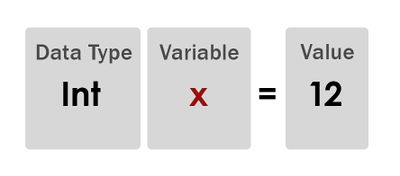Difference between revisions of "Variable"
(→Definition) |
|||
| (18 intermediate revisions by 3 users not shown) | |||
| Line 5: | Line 5: | ||
# an ''[[Identifier|identifier]]'' | # an ''[[Identifier|identifier]]'' | ||
# ''[[Value|value]]'' (a known or unknown quantity of information) | # ''[[Value|value]]'' (a known or unknown quantity of information) | ||
| + | |||
| + | [[File:VariableVisual.jpg|400px]] | ||
=Relevance= | =Relevance= | ||
| + | * [[Field]] | ||
| + | * [[Property]] | ||
| + | * [[Constant]] | ||
| + | * [[Data Type]] | ||
| + | * [[Identifier]] | ||
| + | * [[Keyword]] | ||
=Explanation= | =Explanation= | ||
| Line 14: | Line 22: | ||
A [[compiler|Compiler]] will replace a variable's identifier with the data location. | A [[compiler|Compiler]] will replace a variable's identifier with the data location. | ||
| − | ''' | + | '''Scalar''': an alternative term for a variable. |
| − | |||
==Identifier== | ==Identifier== | ||
An identifier is the name used to reference either the the stored value or the variable itself; the variable's name can be used separately from the data it represents. | An identifier is the name used to reference either the the stored value or the variable itself; the variable's name can be used separately from the data it represents. | ||
| − | |||
| − | |||
| − | |||
| − | |||
| − | |||
| − | |||
| − | |||
| − | |||
==Typing== | ==Typing== | ||
Changing the type of data stored in a variable may change the way the data can be used. For example, in most programming languages two integers added together will produce a sum that is also an integer. | Changing the type of data stored in a variable may change the way the data can be used. For example, in most programming languages two integers added together will produce a sum that is also an integer. | ||
| − | < | + | <syntaxhighlight lang="csharp"> |
| + | class Math () { | ||
a = 1; | a = 1; | ||
| Line 38: | Line 38: | ||
c = a+b; // c will be 3 | c = a+b; // c will be 3 | ||
| + | } | ||
| − | </ | + | </syntaxhighlight> |
However, if a is a string (such as "hello"), adding it to an integer would not necessarily provide you with an integer as a result. | However, if a is a string (such as "hello"), adding it to an integer would not necessarily provide you with an integer as a result. | ||
| Line 52: | Line 53: | ||
</code> | </code> | ||
| − | + | =External Links= | |
| − | + | * [https://en.wikibooks.org/wiki/Computer_Programming/Variables Computer Programming/Variables] | |
| − | + | * [http://openbookproject.net/thinkcs/python/english3e/variables_expressions_statements.html Variables, Expressions and Statements (Python)] | |
| − | + | * [https://docs.microsoft.com/en-us/dotnet/csharp/language-reference/keywords/var C# Var] | |
| − | |||
| − | |||
| − | |||
| − | |||
| − | |||
| − | |||
| − | |||
| − | |||
| − | |||
| − | |||
| − | |||
| − | |||
| − | |||
| − | |||
| − | |||
| − | |||
| − | |||
| − | |||
| − | |||
| − | |||
| − | |||
| − | |||
| − | |||
| − | |||
| − | |||
| − | |||
| − | |||
| − | |||
| − | |||
| − | |||
| − | |||
| − | |||
| − | |||
| − | |||
| − | |||
| − | |||
| − | |||
| − | |||
| − | |||
| − | * [https://en.wikibooks.org/wiki/Computer_Programming/Variables | ||
| − | * [http://openbookproject.net/thinkcs/python/english3e/variables_expressions_statements.html | ||
| − | |||
[[Category:Programming Language Concepts]] | [[Category:Programming Language Concepts]] | ||
[[Category:Data Type]] | [[Category:Data Type]] | ||
| + | [[Category:Object Oriented Programming]] | ||
Latest revision as of 15:21, 22 July 2019
Definition
In programming, a variable is comprised of:
- a storage location (identified by a memory address)
- an identifier
- value (a known or unknown quantity of information)
Relevance
Explanation
As the name variable implies, information may change as the program executes. However, its name, type, and location often remain fixed.
A Compiler will replace a variable's identifier with the data location.
Scalar: an alternative term for a variable.
Identifier
An identifier is the name used to reference either the the stored value or the variable itself; the variable's name can be used separately from the data it represents.
Typing
Changing the type of data stored in a variable may change the way the data can be used. For example, in most programming languages two integers added together will produce a sum that is also an integer.
class Math () {
a = 1;
b= 2;
c = a+b; // c will be 3
}
However, if a is a string (such as "hello"), adding it to an integer would not necessarily provide you with an integer as a result.
a = "hello";
b= 2;
c = a+b; // c will be hello2
